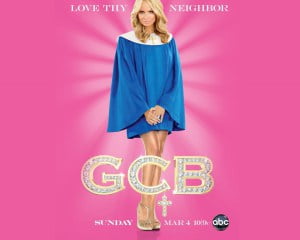 Being the religious nerd that I am and one who likes to keep up with popular cultural expressions of faith, I've watched two documentaries of note. Namely, Christiane Amanpour's ABC news special Back to the Beginning and the History Channel's mini-series, The Bible.
Being the religious nerd that I am and one who likes to keep up with popular cultural expressions of faith, I've watched two documentaries of note. Namely, Christiane Amanpour's ABC news special Back to the Beginning and the History Channel's mini-series, The Bible.
After hearing several of my clergy colleagues talking about the grave inaccuracies of The Bible series, I had to see for myself. And, after sitting through hour after hour of these stories, I agreed.
Large and crucial chunks of the stories were ignored. I missed seeing interactions with characters such as Hannah and Samuel, Ruth and Naomi, Esther and Mordecai and Elizabeth and Mary.
I longed for the more fair portrayal of the birth narrative of Jesus in films such as The Nativity Story.
The whole drama seemed like one political driven made for tv movie (and of course this is what it was). The character who played Jesus was way to pretty (I mean no disrespect to my Lord, but still!) and Jesus' teaching opportunities seemed way too short.
But when it came to Amanpour's documentary which traces the historical roots of the earliest stories of the Christian, Jewish and Islamic scriptures, showing ultimately our common connections, I was pleasantly surprised. In typical Amanpour style, her commentary was balanced, fair can came from a place both of belief but skepticism (which I think is healthy). She acknowledged the spiritual importance of the stories as of ultimate importance way before she began to question the historical traces of the narrative of the Bible.
In fact, her reporting from a hot air balloon ride over Egypt gave me one of the best visuals of life in Egypt I'd ever gotten. As the cameras focused in on the Nile River valley, showing the fertile ground around the river in comparison to the surrounding desert areas, I understood for the first time why the tribes of Jacob got stuck there out of necessity and why it was so hard 400 years later for the children of Israel to leave. The security of the Nile kept Egyptian powerful and led Pharoah to always seek more. For Israel, slavery was tortuous and all but who really wants to leave the land of plenty for the desert?
If you have on demand service through your cable provider, you could probably find it for free there or find clips such as this one on youtube [youtube=http://www.youtube.com/watch?v=kR4DYkiQfRs].
But, what's the larger point? It is worth our time as people of faith to watch such films?
I have to think so.
Even if the visual portrayals are full of depictions that are "in the spirit of the book" (as The Bible disclaims at the beginning of every episode), we can thank Hollywood for them.
Why? Because sometimes-- especially for those of us who are visual learners-- we need pictures to get us stuck out of our heads.
We need representations of stories to send us back to the texts to remember correctly and read for ourselves.
We need opportunities to be reminded that what we read in scripture is meant to challenge us into more faithful patterns of living.
For example, it struck me again as I was watching the opening episode of The Bible how radical a message Abraham received when God told him to leave his homeland because God was going to lead him to the Promise Land as he made his descendants as great as the number of stars the sky.
I've preached on Genesis 12 on countless occasions in my life, but whoa! It's hard to truly put this kind of faith experience in a 20 minute homily.
What crazy decree of God Abram received! What faith it required on Abraham's part to follow through! What a laughing-stock of his neighbors Abram must have been!
Lest, we think our faith is not radical and doesn't ask us to do radical things, it is.
It's a faith that asks 90-year-old women to believe they are going to have a son.
It's a faith that tells young boys they will grow up to be God's spokespersons.
It's a faith that gives words to prophets about the rising and falling of kingdoms.
It's a radical faith.
I'm glad that Hollywood helps me remember-- even if this was not their intention. Maybe it can help you remember too.
 There are some moments of your life that you simply waste. Minus having this blog to write, I could say this about my television viewing experience last night watching the pilot episode of the ABC drama, "GCB."
There are some moments of your life that you simply waste. Minus having this blog to write, I could say this about my television viewing experience last night watching the pilot episode of the ABC drama, "GCB."
It's a satirical drama set in the city of Dallas, TX well set within themes of southern culture and religion. Fellow blogger and colleague, Alan Rudnick, wrote a great summary post about its plot and what the title GCB actually stands for. I would suggest that you check out his blog.
Of course being interested in all things religious and also a native of the South, I agreed to watch GCB via request of my husband, Kevin. Kevin loves being in the know about new television shows and movies and couldn't wait to check GCB out. I didn't think I was going to like it, but with my supportive, "I want to spend time with you" wife hat on, I took it all in.
I only made it through 30 minutes of this one hour show before I was off to do something else. Simply stated: Christians according to GCB are hypocritical, sacrilegious, back-biting and frequently do works of charity out of fear of "not looking the part" among their church friends. It reminded a lot of the feature film from several years ago, Saved (which I can only watch in small chunks).
Alan, in his post talks about how many Christians will have a problem with GCB because of the language and the behavior and the type of Christian culture it portrays (I can't imagine how much hate mail ABC executives are getting right now from right wingers). Alan takes a positive stance and suggests that the presence of a show like GCB on the air is a chance for Christians "to laugh through satire when Christians miss the mark." And, I guess if you don't laugh, you cry, so laughing might be a good exhortation here!
And while, yes I am a fan of satire and not taking one's self too seriously (appropriate uses of humor are always good, I'm with you Alan on this one), I have to say that I was saddened by GCB because I felt so much of the show IS TRUE. In my imagination, I can easily see such characters not as fictional but as real people who can be found in the upper to middle class sections of Dallas as well as other places across the Bible Belt. While the entire South is not ultra conservative, white, evangelical, and closed-minded-- many residents within seem to still live in a cultural bubble. And, their churches and their church leaders to which they cling for council seem to give them permission to isolate themselves as they wish.
The South is a place where one's religion or lack their of is tied to one's identity. A typical church gathering, in many settings can contain a person quoting scripture in one breath and lying, cheating or gossiping in the next. Consider this personal example: I attended a Baptist college in Birmingham, AL and a typical Sunday morning for most students at Samford University, in my experience, included either a) going to church or b) pretended that they went to church even if they didn't by dressing up to go to brunch at the cafeteria. Unless you wanted to be known as one of the campus heathens, you'd fix your hair, put on nice make-up and your Sunday shoes for lunch on Sunday-- no matter where you spent your morning. I called the whole thing "plastic Christianity." It was gross.
It's not that I don't believe that Christians don't miss the mark and that we shouldn't laugh at ourselves. (I miss the mark and find reasons to laugh at myself almost every day!).And I don't want to come across as a hater of the South, because I'm not. I look forward to visiting family and friends in the South and enjoying its unique charms when I can. But, what concerns me most is the land of denial that we live in as people of faith when we see shows like GCB and don't recognize the deeper problems in American society as we've unashamedly wed religion, culture and politics. And, I grieve the lack of clergy leadership among my colleagues in NOT calling our "church culture" problems into the light.
This is what I know about faith:
Faith has always been about a real relationship with God in the day in and day out moments of our lives: not a relationship we get from just showing up on Sunday at services.
Faith has always been about actions that bring forth our inner convictions to world (read the book of James lately?) Faith without works is dead, after all.
Faith has always been about being in the world but not being of the world, so that people know we are Christians not by our hypocrisy but our love. Saying when we make mistakes, "I was wrong" but not making tv shows about how crazy we are. Why? Because we are aiming for a higher standard of discipleship.
Living out a life of faith is hard enough without filling my brain space with images of the type of Christians that irritate me the most. Chilling out by watching tv can be a relaxing way to spend an evening, but not when the show hits too close to home no matter how many good actors and actresses are in it. All I know is that GCB is not for me. (Rant over).